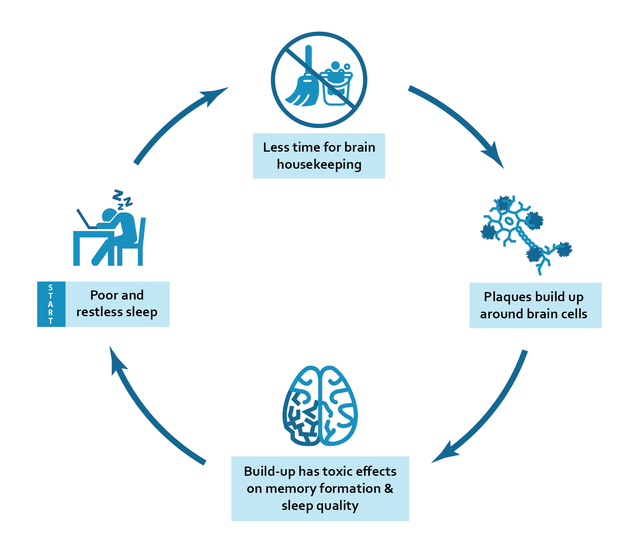
Sleep
Can Sleep Deprivation Cause Alzheimer’s?
A growing body of research says yes.
Posted July 15, 2019

This article is part of an ongoing series about lifestyle factors you can modify to help lower your risk of dementia. Previously we’ve discussed the relationship between dementia and exercise, dementia and nutrition, and dementia and social interaction.
Another important lifestyle habit that is important to reduce your risk for dementia is restful sleep.
In a landmark report, the Lancet Commission (a leading medical journal) determined that around one-third of dementia cases worldwide can be prevented through a healthy lifestyle.1 Effective dementia prevention could transform the future global health outlook and vastly improve the quality of life as we continue to live longer.
According to the Alzheimer's Association, someone in the US develops Alzheimer's disease, the most common form of dementia, every 65 seconds.
Today, 5.7 million Americans live with this disease. By 2050, that number is predicted to reach 14 million.2 Alzheimer's is a frightening and challenging disease, and the news that lifestyle factors play a significant role offers hope to reduce human suffering.
Your Basic Housekeeping
When it operates as intended, the human body is a model of efficiency. Even under stress or harmful exposure to toxins, the body is a warrior working overtime to keep functioning to the best of its ability. We know the body can rid itself of waste through multiple organs and the lymphatic system.
However, the lymphatic system does not reach the brain, and so it has no impact on removing the brain's metabolic waste. For a perfectly designed model, how is it possible that housekeeping stops at the brain? Is this a design imperfection?
Brain Mopping
After a hard day's work, we often bathe to rid ourselves of the accumulated dirt on our bodies. Every day the body effortlessly and methodically cleans itself of all types of metabolic waste through various organs and systems: kidneys, liver, skin, intestines, and lymphatic. Multiple studies now indicate the brain has a unique drainage system to detoxify and cleanse itself.
Consider what happens when mopping a dirty floor. You would be hard-pressed to get the area clean without disposing of and replacing the dirtied water with clean water, right? So, what do you do? You pour the dirty water down the drain, but wait, the water is so thick with debris that it clogs and backs up the drain.
In addition to the backed-up dirty water, you now have more dirt than before because further waste has already begun to accumulate on the floor. And this is what happens to the brain.
The daily metabolic waste (dirt) accumulates in the area (floor) between the neurons. The space where the metabolic waste lodges is narrower during waking hours, with less brain fluid (clean water) present for movement; however, this condition changes when we are asleep (drain). Increased pathways allow more disposal of metabolic waste.
After a good night's sleep, your brain is cleansed and ready for another day of activities and challenges.
What’s Sleep Got to Do with Alzheimer’s?
There are many scientific studies that connect the relationship between sleep and dementia risk.4 They suggest that a good night's sleep can help protect against the onset of dementia. But how exactly?
Throughout the day, our brain cells produce a type of protein called amyloid plaques. Unless removed, they gather in the space between cells and cause extreme harm to the brain. One current theory suggests that the build-up of plaques is a precursor (or biomarker) for Alzheimer's disease, and that restful sleep is a time for housekeeping when these build-ups get removed.
During a good night’s sleep, your brain has time to flush out the toxins that have built up throughout the day. In comparison, interrupted sleep causes the removal process to stop and start, giving your body less opportunity for this activity.5 This theory is supported by animal studies that have shown that mice that slept well had lower levels of plaques.
Further complicating the problem of poor sleep causing plaques is that the reverse relationship is also true. Research suggests that the toxic presence of plaques hinders memory formation and reduces sleep quality.6

According to Dr. Marcelle Morrison-Bogorad of the NIH's National Institute on Aging, "For years scientists believed that it was the overproduction of beta-amyloid that led to its accumulation in the brain. These new findings shift the emphasis to the clearance of beta-amyloid. This may lead to the development of a diagnostic test as well as the identification of new therapeutic targets."7
Those affected by Alzheimer's often experience interrupted or short sleep cycles. Research indicates a greater build-up of plaques in Alzheimer's brains than those without Alzheimer's. Study after study suggests quality sleep allows the brain to best reduce the presence of plaques. During the sleep cycle, beta-amyloid is flushed out.8
Drs. Ehsan Shokri-Kojori and Nora Volkow remark in their study that even one night's sleep deprivation showed an increase of plaque accumulation by 5%.9 The brain is a marvelous thing; given the right conditions, it can bounce back from a night of sleep deprivation.
However, imagine the toll it takes on the brain when experiencing night after night, month after month, and year after year of sleep loss or interrupted sleep?
Don’t Lose Sleep Over It
Ask yourself this question, "How much sleep am I getting every night?". According to expert Dr. Michael Twery, director of the NHLBI’s (National Heart, Lung, and Blood Institute) Center on Sleep Disorders Research, for the brain to fully rest and reset, adults generally require 7-8 hours of quality sleep, infants need 16 hours, young children need 10 hours, and teenagers should aim for 9 hours.10
Many sleep study centers have published tips on Sleep Hygiene (best practices to encourage sleep) such as the United States Center for Disease Control, Stanford, and Harvard.11 The top tips include keeping the room quiet and dark, controlling temperature, and eliminating electronic devices from the bedroom.
Studies support a connection between both sleep quality and quantity and the risk for cognitive decline. Whether you or your loved one receive the diagnosis of Alzheimer's disease, it affects everyone in your family. The emotional and financial toll can be devastating. So, if you're one of those midnight owls – start good sleep practices right now to have better health across your lifespan!
Top Tips for Restful Sleep
Maintain a Regular Sleep Schedule
Create a bedtime routine and try to head to bed and wake up at the same time each time–even on weekends.
Avoid Caffeinated Drinks at Night
Switch out caffeinated drinks like coffee and black tea for alternatives with less caffeine, like white tea, decaf or water, at least 8 hours before you plan to go to bed.
Keep the Bedroom Dark
Close the curtains and turn off the lights to reduce light and noise.
Exercise Regularly
Try to exercise regularly throughout the week, but avoid exercising too closely before going to bed.
Avoid Screens an Hour Before Bedtime
Artificial light from electronics emits blue light which delays the release of melatonin, a key hormone that signals tiredness to the brain. This can make it harder to fall asleep.
References
1. Livingston, G., Sommerlad, A., Orgeta, V., Costafreda, S. G., Huntley, J., Ames, D., ... & Cooper, C. (2017). Dementia prevention, intervention, and care. The Lancet, 390(10113), 2673-2734.
2. Alzheimer's Disease Fact Sheet. NIH. (2019, May 19) Retrieved from https://report.nih.gov/NIHfactsheets/ViewFactSheet.aspx?csid=107
3. Scientists Discover Previously Unknown Cleansing System in Brain. (2012, August 15). Retrieved from https://www.urmc.rochester.edu/news/story/3584/scientists-discover-prev…
4. What is Alzheimer's?. (n.d.). Alzheimer's Association. Retrieved from https://www. alz.org/alzheimers-dementia/what-is-alzheimers
5. Brain may flush out toxins during sleep. (2013, October 17). NIH. Retrieved from https://www.nih.gov/news-events/news-releases/brain-may-flush-out-toxins- during-sleep
6. Sprecher, K. E., Koscik, R. L., Carlsson, C. M., Zetterberg, H., Blennow, K., Okonkwo, C., ... & Bendlin, B. B. (2017). Poor sleep is associated with CSF biomarkers of amyloid pathology in cognitively normal adults. Neurology, 10-1212.
7. Lack of sleep may be linked to risk factor for Alzheimer's disease. NIH/NIAAA. (2018, April 13) Retrieved fromhttps://www.niaaa.nih.gov/publications/presentations-and-videocasts
8. Lim, M. M., Gerstner, J. R., & Holtzman, D. M. (2014). The sleep–wake cycle and Alzheimer's disease: what do we know?. Neurodegenerative disease management, 4(5), 351-362.
9. The Benefits of Slumber – Why You Need a Good Night's Sleep. NIH (2013, April) Retrieved from https://newsinhealth.nih.gov/2013/04/benefits-slumber
10. Tips for better sleep. (n.d.). CDC. Retrieved from https://www.cdc.gov/sleep/about_sleep/sleep_hygiene.html



